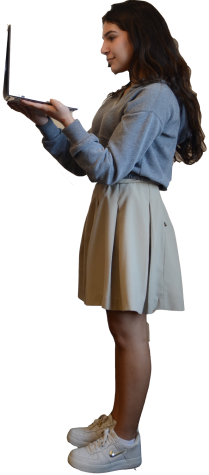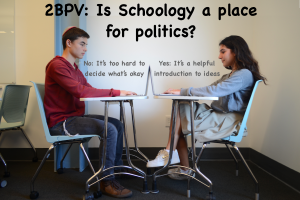Yes: It’s a helpful introduction to ideas
December 9, 2018
By Rena Harkham, 10th grade
 I went on Schoology looking for my Talmud homework, but instead I found myself falling down a rabbit hole of politics, and reasons why Brett Kavanaugh shouldn’t have been appointed to the Supreme Court.
I went on Schoology looking for my Talmud homework, but instead I found myself falling down a rabbit hole of politics, and reasons why Brett Kavanaugh shouldn’t have been appointed to the Supreme Court.
Politics are a contentious topic among the Shalhevet students and teachers, and the latest expression of these tensions is in various political posts on Schoology. Schoology is a great way for students to organize their homework assignments and spread important announcements. It should also be a place where students feel free to share their opinions.
One thing I love about Shalhevet is how it opens up my mind by introducing new ideas and presenting new perspectives, while giving me space to formulate my own opinions. People want to spread their opinions where others will see them, and at Shalhevet, Schoology is that place.
In fact, Schoology is actually the best way for political topics to be talked about, because it can be used as an extension of our Town Hall discussions. Students who run out of time, haven’t really formed an opinion yet during Town Hall itself, or don’t feel comfortable speaking yet can use Schoology as a place to continue the conversation online to convey their opinions and restart the discussion.
And high school is a great place to start creating deeper opinions on things like religion, politics and current affairs. Being exposed to these different opinions helps us formulate our own, and prevents us from falling mindlessly into the crowd later on in our lives.
Some may say that politics should not be discussed on Schoology because arguments could get heated, or that Schoology should just be a place for assignments and announcements. I’d argue that it’s quite the opposite. As a Just Community, we are all part of one Shalhevet kehilla, and we know that at the end of the day our intention is merely to share. Schoology is already a place where students discuss topics such as their love of Israel, chesed (service) opportunities and clubs, whether fashion, astrology or cooking. If we ban politics, what’s next — should we stop discussing food?
Get the latest from The Boiling Point. Sign up for our news feed.
Others may argue that Schoology is a more personal version of social media apps like Instagram and Facebook, and that those are the proper platforms for political debate. Though Schoology is filled with people we interact with on a daily basis, there are still some people who I don’t interact with daily, making Schoology the perfect place to hear or gain more insight on opinions that I otherwise might not hear.
Moreover, on social media we tend to look at (or be shown) only the side of things we want to see. Schoology gives us the opportunity to hear the other side of the story.
Before I came to Shalhevet, I was completely oblivious to the world of politics. Town Hall and Schoology helped open my mind to form new opinions and ideas, introducing me to new things like joining Model Congress and staying more in touch with current events. I am grateful for this.
Since Shalhevet is a place where we can all share our world- views, Schoology should be too. Otherwise our own opinions can close off views of the world that are important for us to see — views held by people right here at our own school.
Looking for my Talmud homework that night when I came across the Kavanaugh controversy, and as I thought about what to make of this, I remembered one of the iconic quotes of Beit Hillel: “If I am not for myself, who will be for me?…If not now, when?” If I am not learning about these topics now, when will I? If I don’t know who I am now, when will I?
That is why it is necessary for us to talk about these important topics now, because if we don’t learn how to do this now — how to think and how to respectfully argue — then when will we? Schoology needs to be a free and open place to exchange ideas, just as Shalhevet is.
CLICK HERE TO READ OTHER TWO BOILING POINTS OF VIEW













